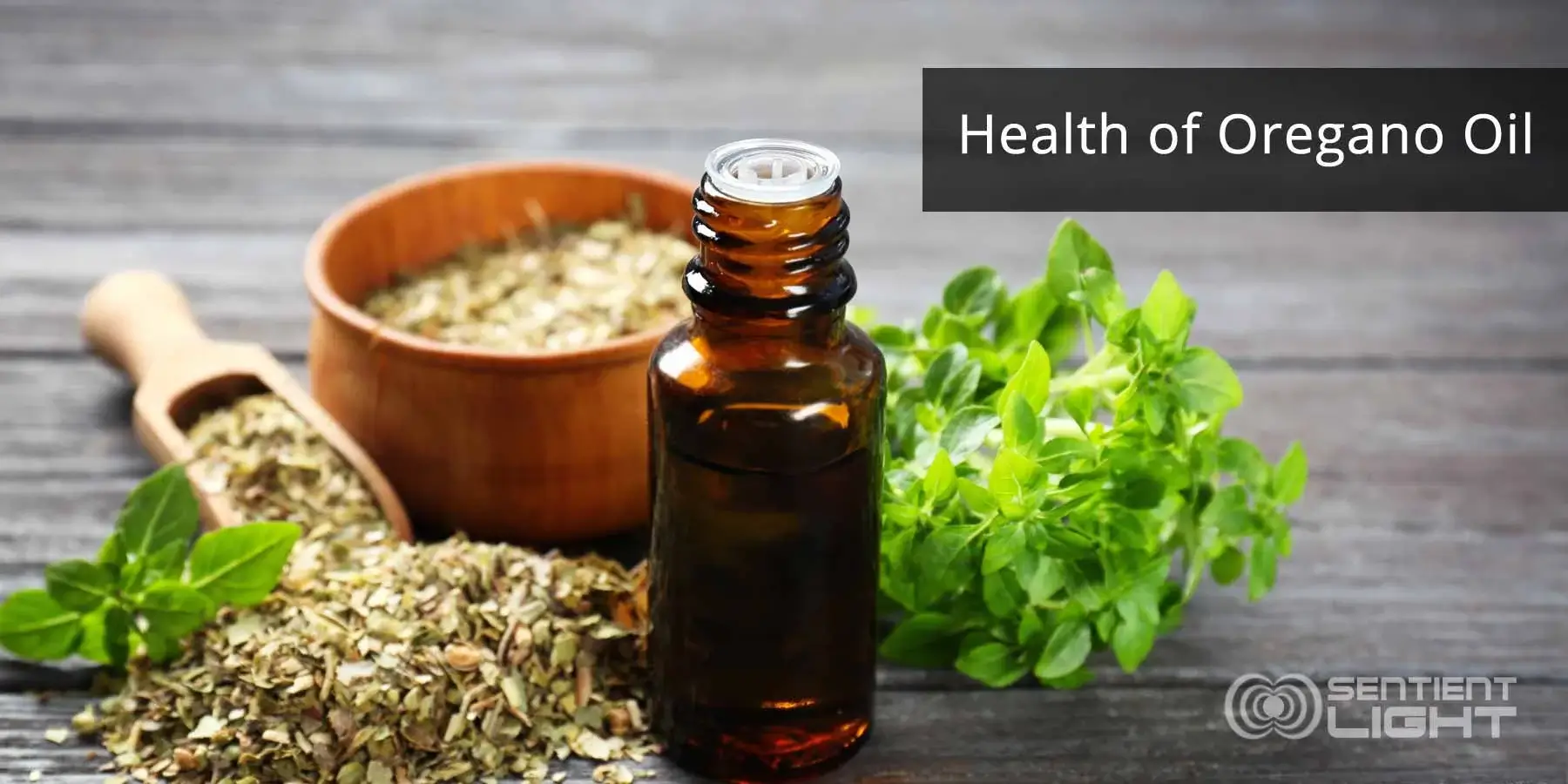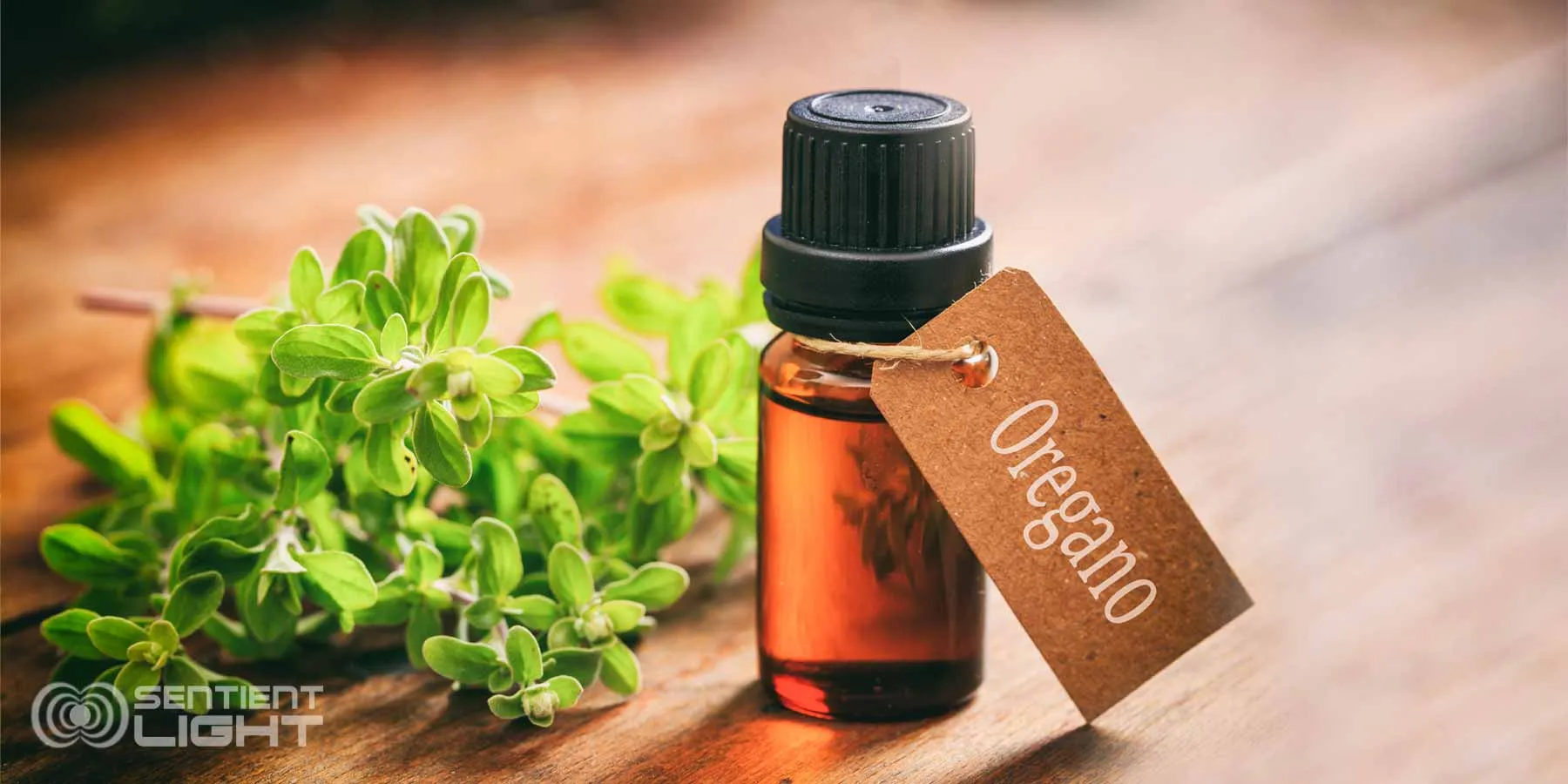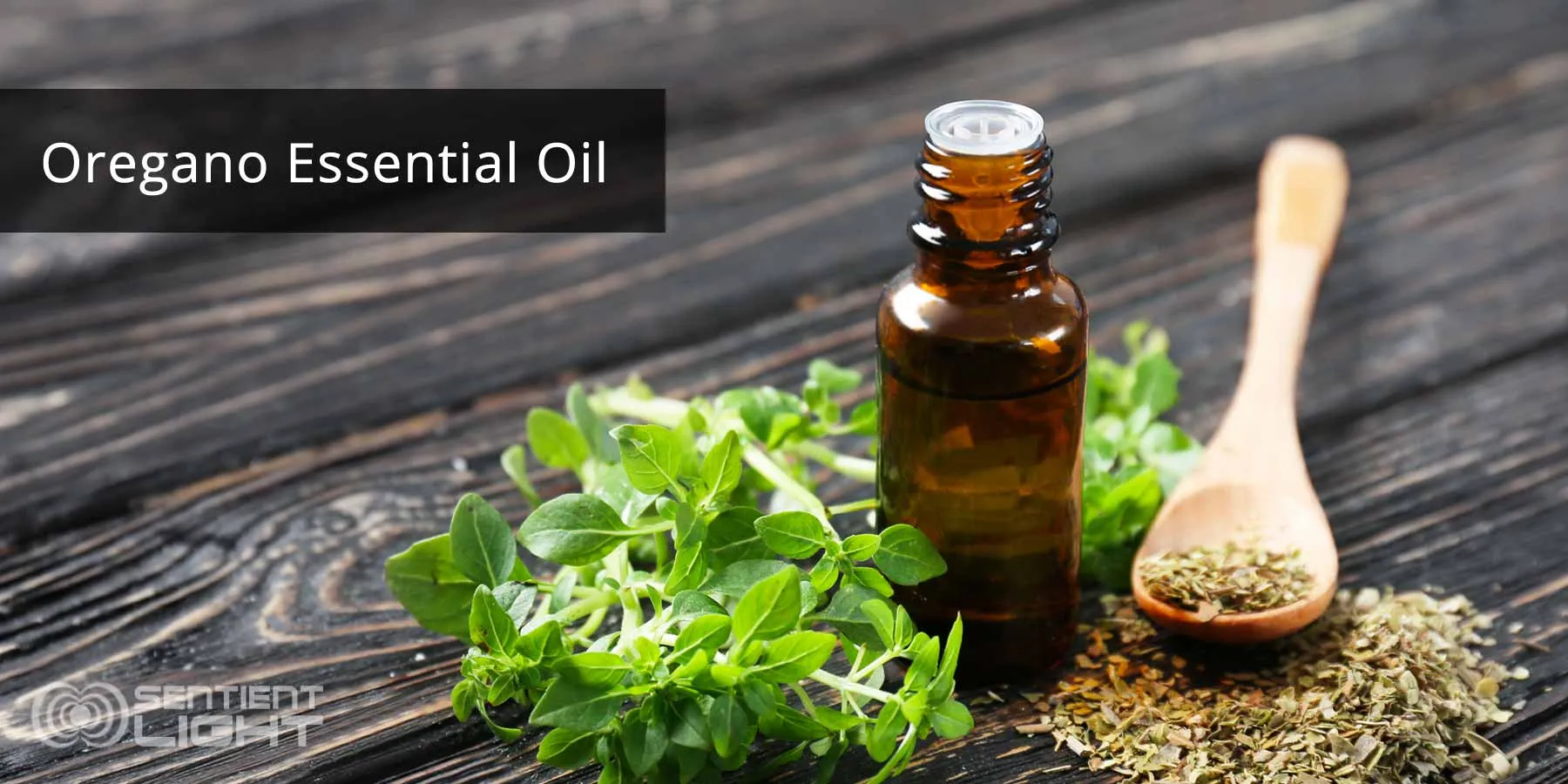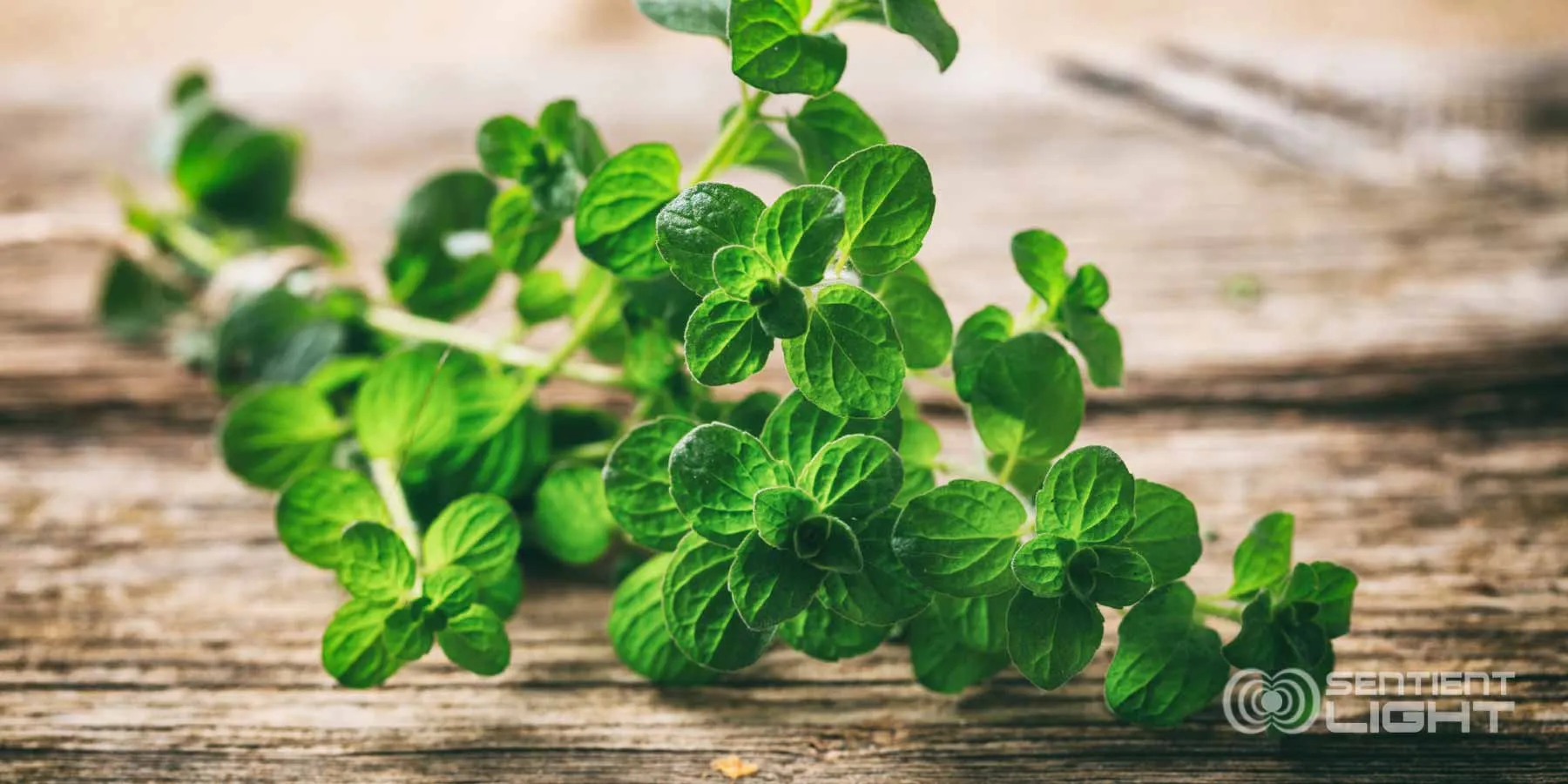Health Benefits of Oregano Essential Oil

What is Oregano?
Oregano is a flowering plant in the mint family. It is native to temperate Western and Southwestern Eurasia and the Mediterranean region.
Oregano essential oil (Origanum vulgare) is widely used and known for its powerful antimicrobial activities. journal Molecules reports that oregano essential oil is commonly used in food preparation and the pharmaceutical industry. There is more and more evidence that oregano oil has many benefits for human health. Compounds in oregano oil have antioxidant, anti-inflammatory, antimicrobial, and anticancer properties.
Oregano essential oil is extracted through steam distillation to produce a concentrated liquid packed with medicinal properties. Oregano leaves are usually dried before extraction to help preserve as much of the essential oil as possible.
The main components in oregano essential oil are carvacrol and thymol. Researchers have found that these compounds give oregano oil its antioxidant and antimicrobial activity. Some medicinal properties of oregano oil are also from oregano compounds such as terpinene, terpineol, and flavonoids.
One type of high-strength therapeutic grade oregano oil is oregano P73. This contains a blend of wild oregano extracts said to have powerful antiviral, antibacterial, and anti-inflammatory properties. The oregano P73 means that it has a claimed concentration of 73% polyphenol.
How to Take Oregano Oil (Oregano Essential Oil):

There are many ways you can benefit from taking oregano essential oil.
If you want to use oregano essential oil topically, it is important to remember that essential oils are extremely concentrated. You should dilute oregano oil with a carrier oil before using it on your skin. Usually, 2-3 drops of oregano oil in a tablespoon of carrier oil, such as olive oil, coconut oil or sweet almond oil can help to address many skin conditions.
If you want to take oregano oil internally, you should always use food grade oregano oil and follow the instructions recommended by the manufacturer. Usually, the dosage of oregano oil is stated on the packet and takes into account the amount of carvacrol and thymol in the product.
For example, taking a dose of 200mg oregano 3 times daily for 6 weeks is recommended for getting rid of parasites.
To use oregano oil in steam inhalation as an anti-inflammatory agent, you can put a few drops of oregano essential oil in a diffuser. You can also use a bowl of boiling water, then cover your head with a towel, close your eyes, and put your face over the bowl, but not too close to get burned, and inhale the steam to clear your nasal passages and throat.
Designed specifically for fighting bacterial infections, antibiotics are one of medical doctors’ favorite tools for treating many health issues. But there’s another underutilized natural “medicine” that many doctors don’t tell their patients about: oregano oil (also called oil of oregano).
Oregano oil is a powerful, plant-derived essential oil that may rival antibiotics when it comes to treating or preventing various infections. In fact, it contains properties that are antibacterial, antiviral and antifungal. And oregano essential oil is unlikely to cause many of the harmful side effects that are commonly attributed to high use of antibiotics — such as increased risk for antibiotic resistance, poor gut health due to destroying beneficial probiotic bacteria, reduced vitamin absorption and leaky gut syndrome due to damage of the GI tract’s lining.
Meanwhile, oregano oil benefits extend beyond just controlling infections. What else is oregano essential oil used to treat? Common examples of conditions that oregano oil can help manage include:
- Athlete’s foot or toenail fungus
- Common colds
- Gingivitis
- Earaches or toothaches
- Digestive problems such as heartburn and SIBO (small intestine bacterial overgrowth)
Oregano (Origanum vulgare) is an herb that is a member of the mint family (Labiatae). Oregano has been considered a precious plant commodity for over 2,500 years in folk medicines that originated across the globe. It has a very long use in traditional medicine for treating colds, indigestion and upset stomachs.
You might have some experience cooking with fresh or dried oregano leaves — such as oregano spice, one of the top herbs for healing — but oregano essential oil is far from what you’d put in your pizza sauce. Found in the Mediterranean, throughout many parts of Europe, and in South and Central Asia, medicinal grade oregano is distilled to extract the essential oil from the herb, which is where a high concentration of the herb’s active constituents are found. It takes over 1,000 pounds of wild oregano to produce just one pound of oregano essential oil! The oil’s active ingredients are preserved in alcohol and used in essential oil form both topically (on the skin) and internally.
When made into a medicinal supplement or essential oil, oregano is often called “oil of oregano.” As mentioned above, oregano oil is a considered a natural alternative to prescription antibiotics. Oil of oregano contains two powerful compounds called carvacrol and thymol, both of which have been shown in studies to have strong anti-bacterial and anti-fungal properties. Oregano’s oil is primarily made of carvacrol, while the plant’s leaves contain a variety of antioxidant compounds, such as phenols, triterpenes, rosmarinic acid, ursolic acid and oleanolic acid.
Oregano Oil Benefits + Research Studies

The predominant healing compound found in oregano oil, carvacrol, has widespread uses ranging from treating allergies to protecting the skin. According to the Faculty of Pharmacy at the University of Messina in Italy:
Carvacrol, a monoterpenic phenol, has emerged for its wide spectrum activity extended to food spoilage or pathogenic fungi, yeast and bacteria as well as human, animal and plant pathogenic microorganisms including drug-resistant and biofilm forming microorganisms.
Carcavol found in oregano essential oil is so potent that it has been been the focus of over 800 studies referenced in PubMed, the world’s No. 1 database for scientific evidence-based literature. To give you a sense of how multi-functional and impressive carvacrol is, it has been shown in studies to help reverse or reduce some of these common health problems:
- Bacterial infections
- Fungal infections
- Parasites
- Viruses
- Inflammation
- Allergies
- Tumors
- Indigestion
- Candida
1. Natural Alternative to Antibiotics
What’s the problem with frequently using antibiotics? Broad-spectrum antibiotics can be dangerous because they don’t only kill bacteria that are responsible for infections; they also kill good bacteria that we need for optimal health.
The Wall Street Journal printed a fantastic article highlighting the dangers that patients may face when they repeatedly use antibiotics. In the author’s words, “Recent studies have shown that doctors are overprescribing broad-spectrum antibiotics, sometimes called the big guns, that kill a wide swath of both good and bad bacteria in the body.”
Overuse of antibiotics, and prescribing broad-spectrum drugs when they aren’t needed, can cause a range of problems. It can make the drugs less effective against the bacteria they are intended to treat by fostering the growth of antibiotic-resistant infections. And it can wipe out the body’s good bacteria (probiotics), which help digest food, produce vitamins and protect from infections, among other functions.
Unfortunately broad-spectrum antibiotics are very commonly prescribed, and often for conditions in which they have no use, such as viral infections. In one study published in the Journal of Antimicrobial Chemotherapy, researchers from the University of Utah and the Center for Disease Control and Prevention (CDC) found that 60 percent of the time when physicians prescribe antibiotics they choose broad-spectrum types. A similar study of children, published in the journal Pediatrics, found that when antibiotics were prescribed they were broad-spectrum 50 percent of the time, mainly for respiratory conditions.
In contrast, what does oil of oregano do for you that makes it so beneficial? Essentially, taking oregano oil is a “broad-spectrum approach” to protecting your health. Its active ingredients help fight multiple types of harmful pathogens, including bacteria, yeast and fungi. As a study in the Journal of Medicinal Food journal stated in 2013, oregano oils “represent an inexpensive source of natural antibacterial substances that exhibited potential for use in pathogenic systems.”
2. Fights Infections & Bacterial Overgrowth
Here’s the good news regarding the use of less-than-ideal antibiotics: there’s evidence that oregano essential oil can help to fight at least several strains of bacteria that cause health problems that are commonly treated with antibiotics.
Dozens of studies confirm the fact that oregano oil can be used in place of harmful antibiotics for a number of health concerns.
In 2011 the Journal of Medicinal Food published a study that evaluated the antibacterial activity of oregano oil against five different types of bad bacteria. After evaluating the anti-bacterial characteristics of oil of oregano it showed significant anti-bacterial properties against all five species. The highest activity was observed against E. Coli, which suggests that oregano oil could potentially be routinely used to promote gastrointestinal health and to prevent deadly food poisoning.
A 2013 study published in Journal of the Science of Food and Agriculture concluded, “O. vulgare extracts and essential oil from Portuguese origin are strong candidates to replace synthetic chemicals used by the industry.” Researchers from the study found that after studying the antioxidant and antibacterial properties of oregano that Origanum vulgare inhibited the growth of seven tested strains of bacteria that other plant extracts could not.
One study involving mice that was published in the journal Revista Brasileira de Farmacognosia also found impressive results: in addition to fighting bacteria like Listeria and E. Coli, they also found evidence that oregano oil may have the ability to help pathogenic fungi.
Other evidence shows that oregano oil’s active compounds (such as thymol and carvacrol) can help fight toothaches and earaches caused by bacterial infections. A 2005 study published in the Journal of Infectious Diseases concluded, “Essential oils or their components placed in the ear canal can provide effective treatment of acute otitis media.”
3. Helps Reduce Side Effects From Medications/Drugs
In recent years many studies have found that one of the most promising oregano oil benefits is helping to reduce side effects from medications/drugs. These studies give hope to people who want to find a way to manage the horrible suffering that accompanies drugs and medical interventions, such as chemotherapy or use of drugs for chronic conditions like arthritis.
A study published in the International Journal of Clinical and Experimental Medicine showed that phenol in oil of oregano could help protect against methotrexate toxicity in mice. Methotrexate (MTX) is a drug commonly used to treat a wide array of issues from cancer to rheumatoid arthritis, but it’s also well known to have dangerous side effects. After evaluating oil of oregano’s ability to keep these factors at bay, researchers believe it’s due to oregano’s antioxidants and anti-inflammatory properties. Oregano was shown to work better than drugs that are ineffective at providing full protection against MTX’s adverse effects.
Similarly, research conducted in the Netherlands showed that oregano essential oil can also “prevent bacterial overgrowth and colonization in the large intestine during oral iron therapy.” Used to treat iron deficiency anemia, oral iron therapy is known to cause a series of gastrointestinal issues like nausea, diarrhea, constipation, heartburn and vomiting.
It’s believed that carvacrol targets the outer membrane of gram-negative bacteria and increases membrane permeability, thereby causing depletion of harmful bacteria. In addition to its antimicrobial properties, carvacrol also interferences with certain pathways for bacterial iron handling which helps to lower side effects of iron therapy.
4. Helps Treat Athlete’s Foot
One study found that a combination of heat, salt and use of essential oils (including oregano) had inhibitory effects against mycelia of T. rubrum and conidia of T. mentagrophytes, bacterial strains that commonly cause the fungal infection known as athlete’s foot. The researchers concluded that “Thermotherapy combined with essential oils and salt would be promising to treat tinea pedis in a foot bath.” After testing the fungicidal activity of 11 essential oils against the bacteria known to cause athlete’s foot, oregano oil was found to be the most powerful (followed by thyme, cinnamon bark, lemongrass and clove).
5. Helps Treat Digestive Issues (Including SIBO & Heartburn)
Several of the active compounds found in Origanum vulgare can help to aid digestion by relaxing the muscles of the GI tract and also helping to balance the ratio of good-to-bad bacteria in the gut. Thymol, one of oregano’s active compounds, is a similar compound to menthol, which is found in peppermint oil. Like menthol, thymol may help relax the soft tissue of the throat and stomach, which can help to decrease GERD, heartburn and discomfort after eating.
Because it helps balance bacteria and fights yeast overgrowth, oregano essential oil is also a popular natural treatment for Candida and SIBO, or small intestine bacterial overgrowth. SIBO is a common digestive problem that causes gas, bloating and intolerances to many carbohydrate-containing foods (especially FODMAPs). Origanum vulgare hinders bacterial replication and can be used similarly to antibiotic medications such as rifaximin (Xifaxan) for treating infections that affect digestive health and nutrient absorption.
A 2014 study published in Global Advances in Health & Medicine found evidence that use of herbal antimicrobials is just as effective as the antibiotic usually given for the treatment of SIBO. When 104 patients diagnosed with SIBO (via lactulose breath test) were treated either with rifaximin (1,200 milligrams) or herbal antimicrobials over the course of four weeks the results showed that 46 percent of the patients treated with herbal antimicrobials experienced symptom improvements, compared to only 34 percent treated with the antibiotic rifaximin. Additionally, 14 of the 44 patients who still had SIBO after a course of rifaximin were then treated with herbal antimicrobials. Fifty-seven percent responded positively to the herbal treatment even after failing to feel better from the antibiotics!
6. Can Help Treat Parasites
One study found that when adults whose stools tested positive for enteric parasites (including Blastocystis hominis which causes digestive distress) supplemented with 600 milligrams of oregano for six weeks many experienced significant gastrointestinal symptoms. There was a “complete disappearance of Entamoeba hartmanni (four cases), Endolimax nana (one case), and Blastocystis hominis in eight cases.” Gastrointestinal symptoms improved in seven of the 11 patients who had tested positive for Blastocystis hominis, which tends to cause symptoms like nausea, gas, bloating and abdominal pain.
7. Helpful for Managing Inflammatory Conditions (Such as IBD or Rheumatism)
Oregano retains its strong antioxidant capacity in both fresh and dry form. Due to its high concentration of antioxidants oregano essential oil can help reduce oxidative damage and help in preventing mutagenesis, carcinogenesis, and aging due its “free radical scavenging activities.” Free radicals are believed to be a contributing factor to common chronic conditions including cancer, cardiovascular diseases, neurodegenerative disorders, and drug toxicity.
One study found that combined treatment with thyme and oregano essential oils helped to reduce the production of proinflammatory cytokines, and thereby may help attenuate colitis (a type of inflammatory bowel disease) in mice. Other studies show that oregano oil is beneficial for treating reoccurring respiratory disorders, tumor growth and rheumatoid arthritis. Researchers from the Universidad Nacional de Córdoba in Argentina found evidence that essential oil isolated from Origanum vulgare “presents antibacterial, antioxidant and chemopreventive properties and could be play an important role as bioprotector agent.”
How to Use Oregano Oil: Uses & Dosage Recommendations

Oregano oil can be used topically, diffused or taken internally (only if it’s 100 percent therapeutic grade oil). Ideally, you purchase 100 percent pure, unfiltered, Certified USDA Organic oregano oil. (It’s also available as oregano oil softgels or capsules to take internally.)
Before using oregano essential oil on your skin always mix it with a carrier oil, such as coconut oil or jojoba oil. This helps to reduce the risk for irritation and adverse reactions by diluting the oil. Mix 3 drops of undiluted oregano oil with a small amount of your carrier oil then apply topically by rubbing into the skin over the affected area.
Oregano oil uses:
- Natural Antibiotic: Dilute it with a carrier oil and apply it topically to the soles of your feet or take it internally for 10 days at a time and then cycle off.
- Battle Candida and Fungal Overgrowth: For toenail fungus, you can make a homemade antifungal powder that can be applied to your skin. Combine the ingredients with about 3 drops of oregano oil, stir and then sprinkle the powder onto your feet. For internal use, take 2 to 4 drops twice daily for up to 10 days.
- Fight Pneumonia and Bronchitis: For external infections, apply 2 to 3 diluted drops to the affected area; to prevent internal bacterial overgrowth, ingest 2 to 4 drops twice daily for up to 10 days.
- Fight MRSA and Staph Infection: Add 3 drops of oregano oil to a capsule or to the food or beverage of your choice along with a carrier oil; take it twice daily for up to 10 days.
- Fight Intestinal Worms and Parasites: Take oregano oil internally for up to 10 days.
- Help Remove Warts: Make sure to dilute it with another oil or mix it with clay.
- Cleanse Mold From the Home: Add 5 to 7 drops to a homemade cleaning solution along with tea tree oil and lavender.
- How much oregano essential oil to take internally:
- Your oil of oregano dosage will depend on the condition you’re treating. In capsule form, oral supplementation of emulsified oregano is typically around 600 milligrams daily (either taken in one or two doses).
- A traditional use of oregano leaves is making digestive-aid tea. You can buy pre-made oregano tea or your own by steeping 15 grams of oregano leaves in 250 milliliters of water for at least five–10 minutes (or longer to make a stronger herbal infusion, up to 24 hours).
- Because oregano oil might interfere with other medications, always ask your doctor if it’s safe to take internally depending on your specific situation.
Precautions When Using Oil of Oregano
The dried herb oregano is typically fine for pregnant women, but generally speaking, it’s not considered safe to use oregano oil during pregnancy. When using oil of oregano, pregnant women should use caution and only use if instructed by their physician to do so. If side effects such as nausea, dizziness or an allergic reaction are ever experienced then stop using oregano oil right away and consider seeing a doctor.
Nutrition facts: Oregano, dried
Amount Per 100 grams Calories265
|
%Daily Value*
|
|
Total Fat4.3 g
|
7%
|
|
Saturated fat1.6 g
|
8%
|
|
Polyunsaturated fat1.4 g
|
|
|
Monounsaturated fat0.7 g
|
|
|
Trans fat0 g
|
|
|
Cholesterol0 mg
|
0%
|
|
Sodium25 mg
|
1%
|
|
Potassium1,260 mg
|
36%
|
|
Total Carbohydrate69 g
|
23%
|
|
Dietary fiber42.5 g
|
170%
|
|
Sugar4 g
|
|
|
Protein9 g
|
18%
|
|
Vitamin A
|
34%
|
|
|
Vitamin C
|
4%
|
|
|
Calcium
|
160%
|
|
|
Iron
|
204%
|
|
|
Vitamin D
|
0%
|
|
|
Vitamin B-6
|
50%
|
|
|
Vitamin B-12
|
0%
|
|
|
Magnesium
|
68%
|
|
*Percent Daily Values are based on a 2,000 calorie diet. Your daily values may be higher or lower depending on your calorie needs.
References:
RELATED POSTS